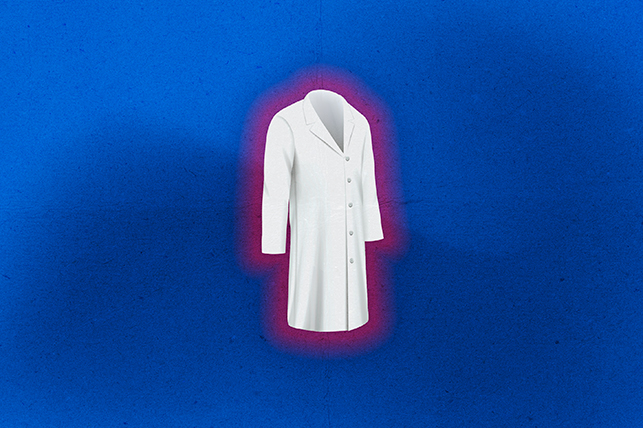How White Coat Syndrome Affects Your Heart

Few of us can say we wholeheartedly love going to the doctor's office. Aside from annual checkups, many of us go whenever we feel something is wrong with us, hoping to get medication or treatment options.
Standard office procedures involve a nurse (sometimes a nursing assistant) checking our blood pressure and recording it before we can see the doctor. But for a small percentage of the population, seeing doctors in white lab coats is a source of anxiety. As a result, their blood pressure reading is elevated beyond the 120/80 (systolic/diastolic mm Hg) level of normal, as defined by the American Heart Association.
About 1 in 5 people have white coat syndrome, according to the Harvard Heart Letter. White coat syndrome has ramifications linked to hypertension and cardiovascular disease, but the effects are more complicated than you might think.
What is white coat syndrome?
The term "white coat hypertension" was first coined by British physician Thomas Pickering in his 1988 paper published in JAMA. However, it's possible the condition might have originated earlier, as doctors began wearing white lab coats to "distinguish themselves from the quacks and snake-oil healers who did not practice evidence-based medicine," according to the Association of American Medical Colleges.
The association referenced a 2016 study in which patients across 10 academic hospitals in America were surveyed on how they viewed doctors in white lab coats. The study found people who wore white lab coats were viewed as more knowledgeable and trustworthy.
But that doesn't stop individuals from feeling anxiety simply from seeing medical professionals in white lab coats.
Bruce Bassi, M.D., M.S., medical director and founder of TelepsychHealth, and a general and addiction psychiatrist in Chicago, echoed that sentiment.
"About 15 to 20 percent of people have this condition," he said, adding that many doctors are aware of this condition because it's something they learned about in medical school.
Causes of white coat syndrome
White coat syndrome used to be less common, according to Amy Baxter, M.D., CEO, chief medical officer and founder of Pain Care Labs in Atlanta and inventor of Buzzy, a device that eliminates unnecessary pain during vaccinations and shots by tricking the brain.
"Prior to the mid 1980s, only about 10 percent of people had a fear of medical procedures," she said in an email. "Few would admit to why they were scared, so we don't know for sure what part of the healthcare visit raised anxiety."
Baxter thinks the causes of white coat syndrome vary and include anxiety from previous illnesses, family illnesses and even the cost of healthcare.
But she believes the main culprit is needle fear.
"In the past three decades, people admitting to needle fear has jumped 252 percent," she added. "Research suggests this is due to the way boosters were introduced."
Knowing there's a possibility of getting shots at the doctor's office, coupled with a barrage of questions about health history, can cause someone to be anxious and afraid, potentially leading to a temporary spike in blood pressure.
The effects of white coat syndrome on the body
Some people consider high blood pressure a "silent killer" because untreated high blood pressure can lead to other life-threatening conditions and illnesses, such as strokes, heart attacks, vision loss, sexual dysfunction and heart failure. Therefore, paying attention to your blood pressure is important for your overall health.
It's important to note the changes in blood pressure at home versus at the doctor's office, but in general, white coat syndrome is "not a medical emergency," Bassi said.
The term "white coat syndrome" is used when multiple instances of high readings occur at the doctor's office.
"I don't usually get worked up over it if it's just one reading," Bassi said.
However, he noted that while high blood pressure isn't exactly an urgent matter as long as the individual has normal readings outside the office, you should still take care of your heart health.
"Keeping your blood pressure normal is one of the best things you can do for your health over time," he said.
Treatments for white coat syndrome
For years, white coat syndrome remained a mystery to medical professionals. Due to its temporary nature, not much can be done to treat the condition.
Bassi said blood pressure medication can be a possible treatment.
"We can start with small doses and increase slowly over time or choose different classes, such as diuretics or ACE inhibitors or ARBs or calcium channel blockers," he added.
But before you resort to medication, it's best to start with lifestyle changes.
"Pay attention to your sleep, your mood and how much exercise you're getting," Bassi said.
A low-sodium diet doesn't hurt, either.
Research on white coat syndrome
Bassi said individuals with high blood pressure are at risk for other medical conditions. He mentioned a recent study that found 62 percent of people with high BP also experienced erectile dysfunction (ED), compared with 20 percent in those with normal blood pressure.
A 2016 study measured 653 patients with untreated white coat hypertension against 653 who had normal blood pressure. The study found the association between white coat hypertension and the incidence of cardiovascular disease events was greater among older men (ages 60 and older) and those with prior cardiovascular risk factors.
Similarly, a longitudinal study among children and adolescents found the majority of patients who had been diagnosed with white coat hypertension progressed to an abnormal ABPM (ambulatory blood pressure monitoring) phenotype, such as hypertension or prehypertension.
As alarming as these studies may sound, perhaps the best (and only) thing to do is to monitor your blood pressure regularly and pay attention to your lifestyle choices. And when the white coat anxiety comes, remember that it's temporary.


















